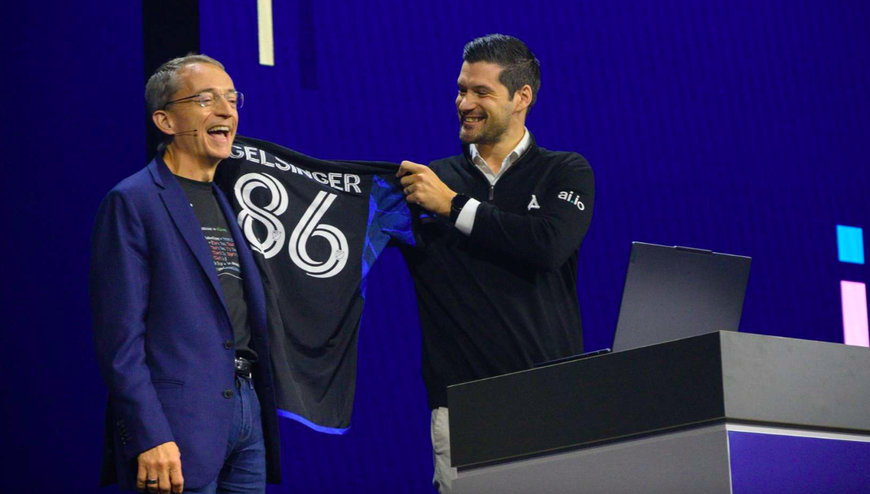www.ptreview.co.uk
21
'23
Written on Modified on
AI.IO STRIKES AI SUCCESS WITH INTEL
Intel-powered artificial intelligence technology enables sports coaches to find talent previously inaccessible or missed.

Richard Felton-Thomas, COO and director of Sport Science at ai.io, presents Intel CEO Pat Gelsinger with a jersey during the Intel Innovation Event in September 2023. (Credit: Intel Corporation)
In the competitive world of professional sports, scouts and coaches can have a tough time finding the right talent. And the most talented players can have a tough time getting noticed by the right teams.
Worldwide, more than 300 million athletes play football (soccer to those in the U.S.). Aspiring players are desperate to be noticed, while scouts are overwhelmed with that pure volume of players.
Since 2021, British-born ai.io has been working with Intel to make the company’s results faster and more cost-efficient. ai.io began its work with Intel through 3DAT (3D Athlete Tracking), which enables camera data to be captured, rendering 3D data real time and provides 3D sports-biomechanics reporting. Recently, the company has integrated multiple Intel hardware and software solutions across its platform, including Intel® Xeon® and Intel® Core™ processors, 5G communications technology, OpenVINO™ to improve efficiency and Intel® Gaudi® AI accelerators.
The company’s custom computer vision models were trained on AWS DL1 instances powered by Gaudi accelerators, which reduces the AI training costs. On inference, its AI models are optimized with OpenVINO and run Intel® Xeon® Scalable processors.
The aiScout app is available for download by anyone, anywhere. It gives any athlete the opportunity to record themselves performing drills that have been carefully designed by the ai.io sports science team. The results, after they are crunched by ai.io’s AI algorithms, show how players stack up against others globally. And if they hit the mark, they can be contacted by a scout and developed as a player.
Partnering with pro teams, universities, leagues and federations, ai.io is changing the face of recruiting across sports.
Helping players and helping teams
The videos and analysis created by ai.io are stored in the cloud, where the AI models perform advanced human movement analysis that looks at skeletal tracking, inverse kinematics and biomechanics. Through this process, athletes are given scores helping them pinpoint specific areas to work on. And it allows clubs to benchmark the skillset of the players they have and find players to fill any gaps or areas they are lacking.
Another innovative part of the ai.io platform is aiLabs. ai.io’s gold-standard equipment housed in a mobile lab provides sporting organizations with real-time access to data and insights from any location. Analysis helps players fine-tune their performance with specific real-time feedback, identifying areas to work on and pre-emptively spotting possible upcoming injuries.
The goodness of using ai.io’s technology doesn’t end with athletes and coaches. aiScout allows for unlimited scale with a more sustainable result. The carbon footprint of sports scouting is reduced as scouts travel less than before, targeting their travel to players already identified through aiScout data. Scouts are not replaced with the technology, but their ability to find more talent is increased significantly.
In the competitive world of professional sports, scouts and coaches can have a tough time finding the right talent. And the most talented players can have a tough time getting noticed by the right teams.
Worldwide, more than 300 million athletes play football (soccer to those in the U.S.). Aspiring players are desperate to be noticed, while scouts are overwhelmed with that pure volume of players.
Since 2021, British-born ai.io has been working with Intel to make the company’s results faster and more cost-efficient. ai.io began its work with Intel through 3DAT (3D Athlete Tracking), which enables camera data to be captured, rendering 3D data real time and provides 3D sports-biomechanics reporting. Recently, the company has integrated multiple Intel hardware and software solutions across its platform, including Intel® Xeon® and Intel® Core™ processors, 5G communications technology, OpenVINO™ to improve efficiency and Intel® Gaudi® AI accelerators.
The company’s custom computer vision models were trained on AWS DL1 instances powered by Gaudi accelerators, which reduces the AI training costs. On inference, its AI models are optimized with OpenVINO and run Intel® Xeon® Scalable processors.
The aiScout app is available for download by anyone, anywhere. It gives any athlete the opportunity to record themselves performing drills that have been carefully designed by the ai.io sports science team. The results, after they are crunched by ai.io’s AI algorithms, show how players stack up against others globally. And if they hit the mark, they can be contacted by a scout and developed as a player.
Partnering with pro teams, universities, leagues and federations, ai.io is changing the face of recruiting across sports.
Helping players and helping teams
The videos and analysis created by ai.io are stored in the cloud, where the AI models perform advanced human movement analysis that looks at skeletal tracking, inverse kinematics and biomechanics. Through this process, athletes are given scores helping them pinpoint specific areas to work on. And it allows clubs to benchmark the skillset of the players they have and find players to fill any gaps or areas they are lacking.
Another innovative part of the ai.io platform is aiLabs. ai.io’s gold-standard equipment housed in a mobile lab provides sporting organizations with real-time access to data and insights from any location. Analysis helps players fine-tune their performance with specific real-time feedback, identifying areas to work on and pre-emptively spotting possible upcoming injuries.
The goodness of using ai.io’s technology doesn’t end with athletes and coaches. aiScout allows for unlimited scale with a more sustainable result. The carbon footprint of sports scouting is reduced as scouts travel less than before, targeting their travel to players already identified through aiScout data. Scouts are not replaced with the technology, but their ability to find more talent is increased significantly.
www.intel.com

